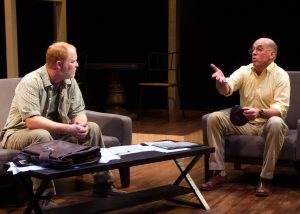After the Revolution
by Myron Meisel
 The prophet Ezekiel, preaching to the Baybylonian exiles, decried the maxim that “the fathers have eaten sour grapes, and the children’s teeth turn out,” insisting that each generation was responsible for its own sins. While as moralists we might agree, if we eschewed the concept, where would the modern theater be?
The prophet Ezekiel, preaching to the Baybylonian exiles, decried the maxim that “the fathers have eaten sour grapes, and the children’s teeth turn out,” insisting that each generation was responsible for its own sins. While as moralists we might agree, if we eschewed the concept, where would the modern theater be?
In mid-1999 (the precise period is crucial to the play’s vision), recent law graduate Emma Joseph (Marina Michelson) runs a foundation devoted to social causes in the name of her recently deceased grandfather, Joe Joseph, a celebrated Marxist blacklisted from his role at the fledgling United Nations in the postwar Red hysteria. A prominent and unrepentant victim of injustice, Joe remains a beloved hero to unreconstructed radicals of all ages, his name a potent fundraising brand.
Emma and her classmate/boyfriend Miguel (Andrew Puente) are preparing appellate briefs on behalf of longtime Black Panther journalist Mumia Abu-Jamal, convicted and sentenced to death for the murder of a Philadelphia police officer, when her father Ben (Robert Foran) is forced to disclose to her an inconvenient truth uncovered in recently released secret Soviet files.
Much lauded playwright Amy Herzog (her 4,000 Miles was a Pulitzer finalist) here toils in a vineyard of similar terroir as Arthur Miller (and, by extention, Ibsen), arguably with a more refined sensibility. Her characters are less bombastic, fleshed out with more empathy, nuance and irony, quirkier and less prone to symbolic significance. The fairly intricate moral quandaries and political issues are clearly presented, perhaps not with great complexity, but with considerable respect for their complexity.
Indeed, a sentimental Old Leftist could find much to sympathize with, especially the flaws of the ideologically stunted characters, all of whom have their reasons, some with psychological insight and other more unforgiving of deviations from doctrine. No matter whether fellow travelers or card carriers, the Party exerts its dictates even though, it’s like, 1999.
Nevertheless, Herzog has written an intelligent commercial play, its arcane allegiances accessibly made vivid, the core family drama managing to make anyone from the most recalcitrant true believer to the most cluelessly historically uninformed able to respond to these ancient dilemmas. In fact, the characters, for all their ornery adherence to principle, end up portrayed as far less appalling than endearing. Some of this play’s limitations of scope and ambition are a direct consequence of its frank friendliness.
This rather good, if hardly groundbreaking, work receives a first-class production, as directed by Oanh Nguyen on a shoestring budget. It’s uniformly well-acted, alert to the turn-of-the-Millennium contextual details, and directed with a fluency that belies its thorny themes and possibly obscure political context. It’s certainly not an easy show to make seem so effortless.
And lest its concerns be deemed less than relevant in our era where the spectrum by which the center is divined has moved so sharply to the right, the day before the opening, I was presented with an online petition, which I signed, seeking medical help being denied the seriously ill prisoner Mumia Abu-Jamal.
Leave a Reply

